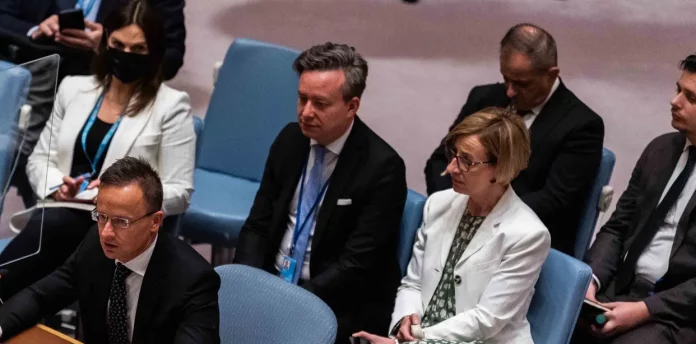The Hungarian Foreign Minister stated this week that there is no high-level relationship with the Biden administration.
Szijjarto was in New York City for a meeting with the United Nations Security Council hosted by Secretary Antony Blinken. He spoke out to defend his country’s position regarding Ukraine and stated that his country supports Sweden and Finland joining NATO.
During the Trump administration, Hungarians had strong relations with the U.S. The NATO member and European Union member are now looking in at the Biden administration. Szijjarto said that since the election of President Biden, there has been no high-level interaction. Szijjarto also stated that previous regular contacts were cut and that there has never been a substantive bilateral meeting between Secretary Blinken and him. “I see no interest from U.S. government in this.”
He stated that, despite their imperfect relationship, the U.S.-Hungary economic and military relationship was still strong “even though it has been downgraded by current administration.”
Hungary, an ex-communist-bloc country, joined NATO in 1999. Since then, it has been an active member. Szijjarto said that Turkey understands the importance and value of Turkey’s membership in NATO. He also stressed that Finland and Sweden must address the concerns expressed by the Turks.
Hungary is approximately the same size and borders Ukraine as Virginia. Hungary was criticised for not allowing lethal weapons to be transported through it to Ukraine. It refused to lift an EU oil ban against Russia. Critics allege that Viktor Orban (Hungarian Prime Minister and conservative) has been working for Russian President Vladimir Putin. Szijjarto disagreed.
“I deny this accusation. Hungary stands for Ukraine. It’s not an issue. We support Ukraine’s friends and offer our support in other ways. We have received (700,000.) refugees. He stated that nearly 200,000 tons have been sent in humanitarian aid. “And we don’t allow weapons to transit through Hungary because our number one concern is safety of Hungary, and the Hungarian people.”
He said that Hungarians had lived along the Ukraine’s border for over four centuries, and that Hungary didn’t want Russia to target them.
Szijjarto stated that Hungary had accepted sanctions but not the agreement for the pipeline, despite being accused by the EU of trying to prevent a ban on Russian oil from the EU. “The European Commission already has six packages of sanctions. Five have been voted upon by us all and five by Hungary. We are very concerned about the sixth package.
He said that about 65% of Russia’s oil supply came from the country, which is a sign of the problem.
He admitted that Hungary had a solution, and was eager for more information from the European Union as well as its member countries.


